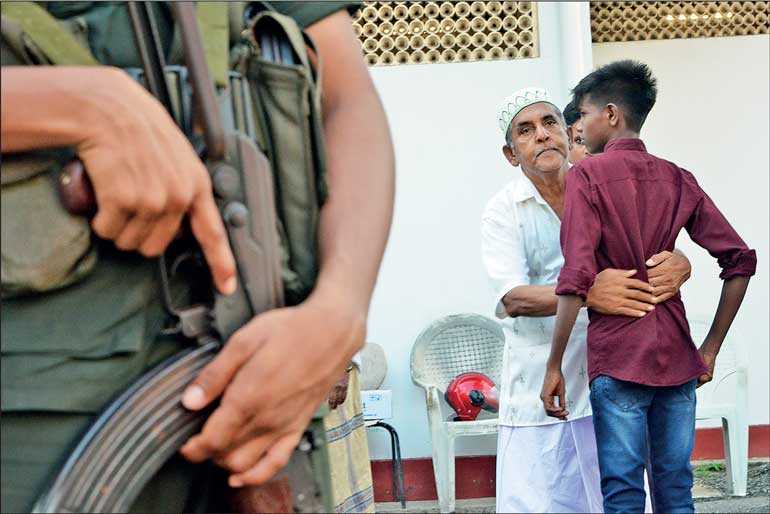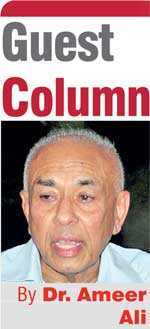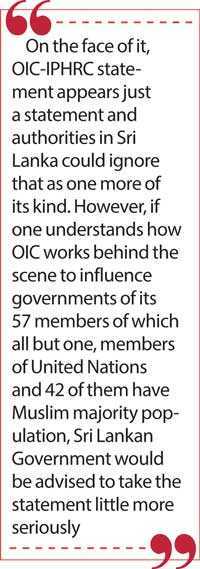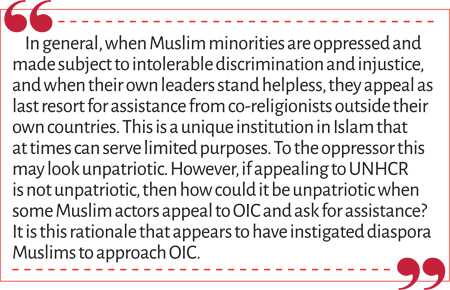Sunday Feb 15, 2026
Sunday Feb 15, 2026
Friday, 7 May 2021 00:00 - - {{hitsCtrl.values.hits}}

Picking the Easter carnage, which should not be condoned under any circumstance, for that purpose, and unwilling to expose to the public the full story behind that horror and identity of the “boss” who masterminded it, Muslims are scapegoated and portrayed as security threat – Pic by Shehan Gunasekara
 In the wake of United Nations Human Rights Commission’s resolution passed in Geneva, to which only four Muslim countries (Bangladesh, Pakistan, Somalia and Uzbekistan) voted for Sri Lanka, and encouraged by that resolution, the Independent Permanent Human Rights Commission (IPHRC) of Organization of Islamic Cooperation (OIC) has issued a separate statement condemning the Sri Lankan Government’s discriminatory laws against Muslims in the name of deradicalisation and counter terrorism.
In the wake of United Nations Human Rights Commission’s resolution passed in Geneva, to which only four Muslim countries (Bangladesh, Pakistan, Somalia and Uzbekistan) voted for Sri Lanka, and encouraged by that resolution, the Independent Permanent Human Rights Commission (IPHRC) of Organization of Islamic Cooperation (OIC) has issued a separate statement condemning the Sri Lankan Government’s discriminatory laws against Muslims in the name of deradicalisation and counter terrorism.
That statement also notes with serious concern the arbitrary arrests and incarceration of Muslims under the draconian Prevention of Terrorism Act (PTA), and torturing them to force confession out of them for some imaginary allegations.
On the face of it, OIC-IPHRC statement appears just a statement and authorities in Sri Lanka could ignore that as one more of its kind. However, if one understands how OIC works behind the scene to influence governments of its 57 members of which all but one, members of United Nations and 42 of them have Muslim majority population, Sri Lankan Government would be advised to take the statement little more seriously.
Sri Lanka’s relations with Muslim countries
Until the current NGR-MR regime came to power, Sri Lanka’s relations with Muslim countries had been exceptionally cordial. There was an unwritten alliance of convenience between Muslims and governments in power, from which both stood to benefit.
While governments benefited by winning markets for domestic exports in the Middle East and through financial assistance from affluent Arab nations by way of investments and aid, Muslim community at home benefited un turn from governments through special preferences extended to its members in the name of affirmative discrimination.
The cordiality between Sri Lanka and Muslim world reached its apex during the 1970s, and the 1976 Non-Aligned Conference held in Colombo was its most ostentatious display. In fact, the treatment of Muslims at home became a show case for domestic governments to show to the world and defeat the spread of a vicious campaign during the civil war that Sri Lanka was ethnically discriminating its minorities.
 What made OIC issue damning statement against Sri Lanka?
What made OIC issue damning statement against Sri Lanka?
All that has changed now and for the first time, OIC, which is normally a sleepy organisation weakened by internal dissensions, has acted in unison and issued a damning statement against Sri Lanka. What made it to do so?
One common factor that is working behind the scene to bring international pressure on the Sri Lankan Government is the role of diaspora Sri Lankans. This factor cannot be ignored any more, and its strength is increasing by the year.
Over 70 years of misgovernment has created a multiethnic and multireligious Sri Lankan diaspora community, consisting of Burghers, Tamils, Muslims and Sinhalese. Quite a significant number among them have advanced professionally and financially, and are becoming influential and a force to be reckoned with in the politics of Western democracies. Their influence was recognised even by Sri Lankan diplomats when they accounted for Sri Lanka’s defeat at UNHCR in Geneva.
The diaspora community wants their country of birth to prosper and regain its lost fame as a democratic, economically resourceful, highly literate and socially advanced country, but realises that such recovery is not possible unless the country is cleansed of its corrosive politics buried in corruption, nepotism, ethno-religious chauvinism, protected by the military. All what the expatriates could do is to bring pressure from outside.
It was that pressure from a small but steadily growing Muslim diaspora, which worked behind the scene to make OIC act. Through OIC that pressure would be felt by governments of some influential Muslim countries, which belong to the same camp that got the UNHCR resolution passed in Geneva. Therefore, it is sheer short sightedness on the part of the current regime to jeopardise the cordial relations built over several decades with Muslim nations.
The Muslim world is much larger and richer than Bangladesh, Pakistan, Somalia and Uzbekistan put together. Depending on China and Russia to veto any sanctions recommended under UNHCR resolution, and imposed by at least one or two Muslim countries is to court economic disaster.
Utility value of the concept of Muslim ummah
It is during times of adversity Muslim minorities feel the utility value of the concept of Muslim ummah. As the two professors, James Piscatori and Amin Saikal argue, umma is a “tool for a variety of social, and political actors” (Islam Beyond Borders: The Umma in World Politics, New York: Cambridge University Press, 2019, p. 160) to achieve a variety of social and political ends.
In general, when Muslim minorities are oppressed and made subject to intolerable discrimination and injustice, and when their own leaders stand helpless, they appeal as last resort for assistance from co-religionists outside their own countries. This is a unique institution in Islam that at times can serve limited purposes. To the oppressor this may look unpatriotic. However, if appealing to UNHCR is not unpatriotic, then how could it be unpatriotic when some Muslim actors appeal to OIC and ask for assistance? It is this rationale that appears to have instigated diaspora Muslims to approach OIC.
 Solution to the Sri Lankan Muslim issue
Solution to the Sri Lankan Muslim issue
Even then, solution to the Sri Lankan Muslim issue should be found within Sri Lanka. International pressure on the Government can be of limited assistance but not a permanent cure. The discontent against the regime is growing amongst all communities. That noisy protest arising spontaneously from motorists, cyclists and pedestrians, while the Chinese VVIP’s cavalcade was passing through was one demonstration of that discontent.
While the epidemic is playing havoc with people’s lives mostly because of the Government’s inconsistencies in adhering to expert advice, and with the national economy in tatters, the regime is desperately searching for tactics to hold on to power by deflecting criticisms against it.
Picking the Easter carnage, which should not be condoned under any circumstance, for that purpose, and unwilling to expose to the public the full story behind that horror and identity of the “boss” who masterminded it, Muslims are scapegoated and portrayed as security threat.
It is in this context that Minister Chamal Rajapaksa’s recent remark that without security no development is possible causes concern to the discerning. How can the Minister guarantee security while his Government deliberately creating space for insecurity to grow?
Is that why the Government is arresting Muslims on trumped up charges in the name of protecting national security? Is that why rehabilitation centres are cropping up to populate with Muslim suspects and to carry out the so called deradicalisation program? If that is also insufficient, will the regime then look for another July 1983? A desperate regime can resort to desperate measures.
Given this disturbing scenario, how should Muslims make use of the rising discontent and join efforts by others to bring about a regime change? The OIC statement may give some psychological satisfaction for a beleaguered community. Will that statement be translated into some form of action by Muslim countries is yet to be seen?
However, with an impotent Muslim leadership at home, the time has come for the community to think of the unthinkable and join hands with other citizens to work towards a better future – a subject to be discussed in a separate piece.
(The writer is attached to the School of Business & Governance, Murdoch University, Western Australia.)